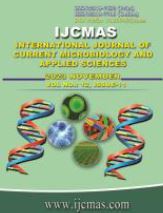


 National Academy of Agricultural Sciences (NAAS)
National Academy of Agricultural Sciences (NAAS)

|
PRINT ISSN : 2319-7692
Online ISSN : 2319-7706 Issues : 12 per year Publisher : Excellent Publishers Email : editorijcmas@gmail.com / submit@ijcmas.com Editor-in-chief: Dr.M.Prakash Index Copernicus ICV 2018: 95.39 NAAS RATING 2020: 5.38 |
Annual production of plastic has increased the 390.7 million metric tons in 2021 and plastic’s reprocessing has all but its sustainable solution for disposal of plastic waste has been unsuccessful. Plastic materials (fragments) are continuously accumulating in the environment, like, in sea, soil, air, rivers as well as oceans. Microplastic contamination is becoming a major concern worldwide. Nowadays, scientists are developing sustainable idea for the degradation of plastic waste with the help of microorganisms. In biodegradation of microplastics by microorganisms like fungi and bacteria are playing vital role in breaking-downs of the plastic polymers in simpler form and after that plastics are biologically degraded. Microorganisms (Pseudomonas sp., Rhodococcus sp., Bacillus sp., Zelerionmaritimum, Microalgae) that can degrade the different types of regular used synthetic plastics. The bacterial and fungal species produced Biosurfactants which helps the degradation process rapidly.
 |
 |
 |
 |
 |